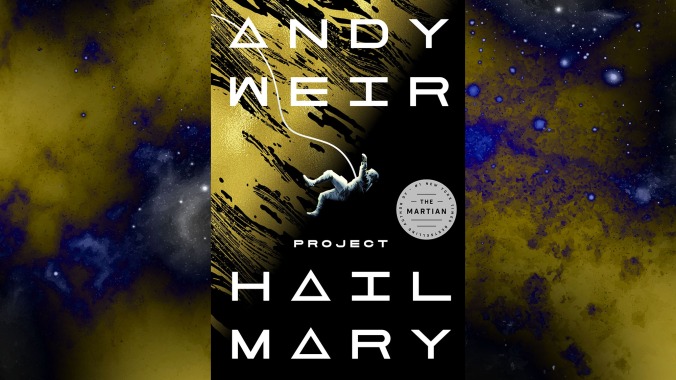With Hail Mary, the author of The Martian tries to recapture that old man-vs.-space magic

As Ready Player One’s Ernest Cline is to outdated pop culture references, Andy Weir is to the science of space. The author of The Martian shares the same guileless enthusiasm for the intricacies of his obsession, the same willingness to sacrifice all other elements of a novel—pacing, structure, characterization—on the altar of getting across just how much he loves this shit. If that equation ends up tilting against Cline in Weir’s favor, that’s largely because learning about the hard science of space travel and interstellar problem-solving is vastly more interesting than hearing about how cool someone thinks Back To The Future is.
Another check in Weir’s column is that, with his new novel, Hail Mary, he seems to be figuring out what he does best. He’s still not a terribly good writer, though, with a clunky conversational style that favors telling over showing and more unnecessary explication than a dozen Blade Runner voice-over tracks (at one point, he explains why products that come with built-in batteries include a plastic strip to prevent the battery from running down before purchase). Weir is unable to resist staying focused on the situation at hand when there’s an opportunity to drop in another factoid, often accompanied by a dad joke. But with his latest book, he’s gone back to the same basic premise that allowed him to best utilize that skillset in The Martian: one dorky guy, unexpectedly alone in space, desperately trying to pool his resources and apply a wealth of knowledge toward survival—only in this case, it’s about the survival of the entire planet.
The story begins with a tantalizing, Twilight Zone-esque setup: A man wakes up on a spaceship with no idea who he is or how he got there, and two dead bodies in the room with him. As the memory loss from his induced coma begins to clear, he starts to recover bits of information. The book’s structure alternates flashbacks with his present effort to understand his predicament, leading to the revelation that not only is he hurtling through space, but he’s also far beyond our solar system. Also: Something is slowly draining energy from the sun, and our protagonist, scientist-turned-schoolteacher Ryland Grace, has been sent on a last-ditch effort to figure out how to stop it and get the information back to Earth before the dimming of our star destroys all life on the planet.
It’s a strong, simple idea for a novel that allows Weir to engineer his plot to benefit his limited range as an author. As in The Martian, it’s a first-person account that largely consists of one science enthusiast talking to himself in the vastness of space. In this arrangement, the author’s foibles come to the fore without highlighting that this is the only way Weir is capable of writing. The big problem with Artemis, Weir’s dreadful second novel, was that it tried to take the exact persona of The Martian’s Mark Watney and transfer it to a character and setting that didn’t mesh with it at all. Perhaps realizing how poorly he fares outside of this narrow arena, the author has returned to a narrative that can help excuse his writing’s weaker elements as the rambling, hokey internal monologue of a man who’s never happier than when he’s solving puzzles, and then making a pun about it.
 Keep scrolling for more great stories.
Keep scrolling for more great stories.
